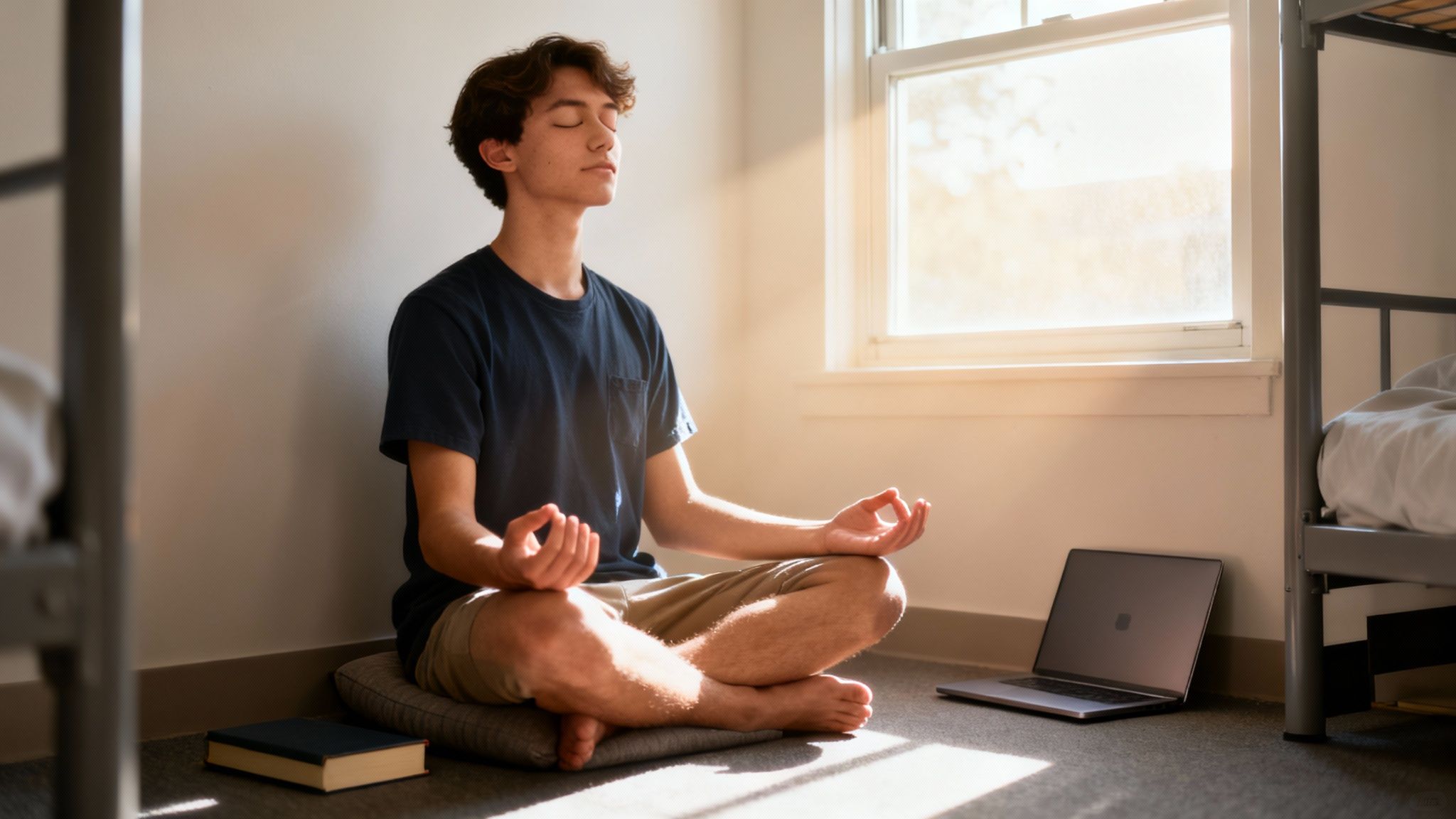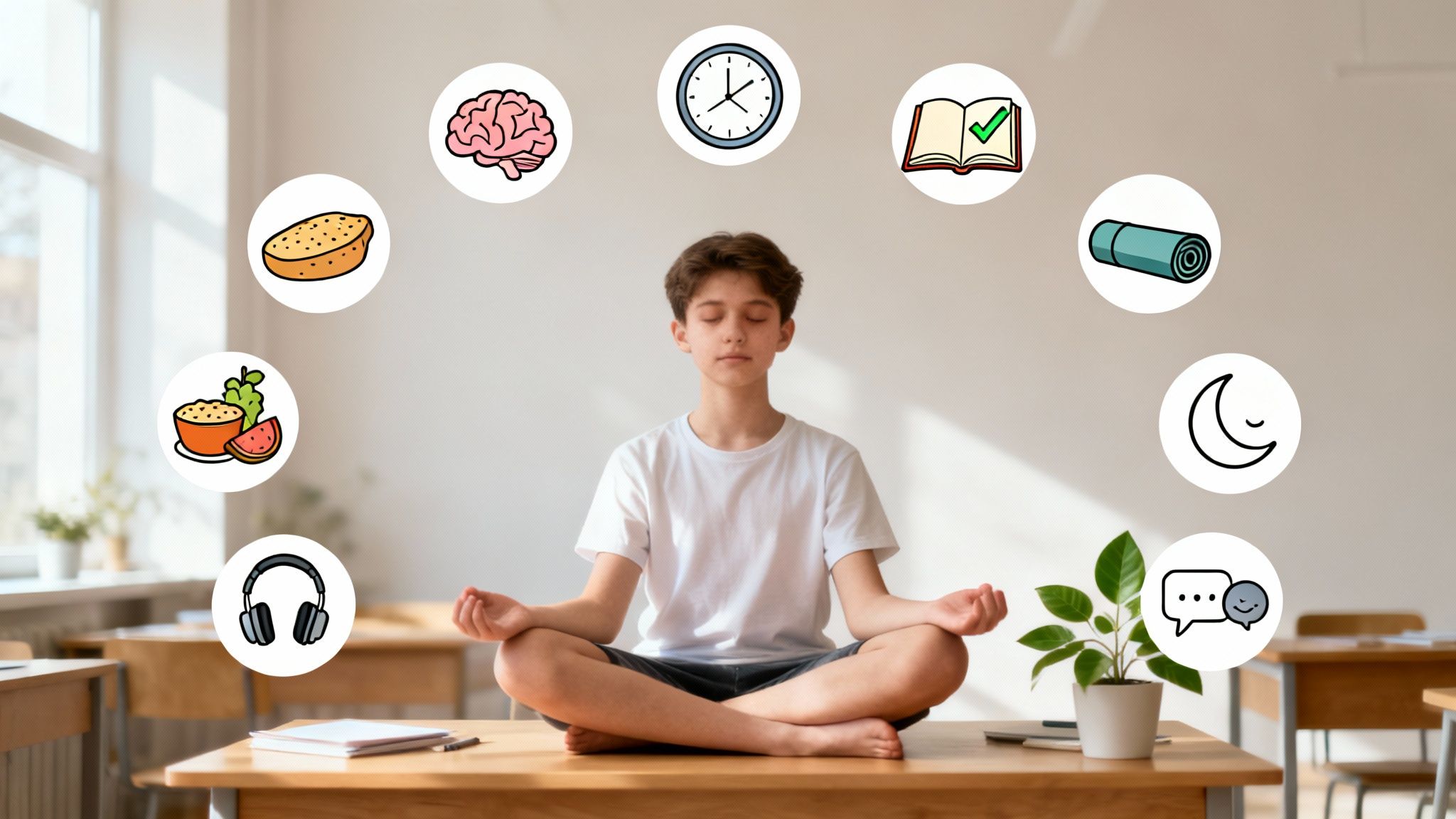Student life, whether in India or anywhere globally, is a dynamic mix of academic goals, new friendships, and personal growth. However, the pressure to succeed can often lead to significant stress, anxiety, and even burnout, impacting not just your grades but your overall well-being. This journey requires you to manage your mental health with the same care you give to your deadlines.
This guide offers practical, evidence-based stress management techniques for students to help you build resilience and find a healthier balance. We will explore actionable strategies you can weave into your daily routine, from the calming power of deep breathing to the focus that comes from good time management. Each technique is a tool for your well-being toolkit.
Think of this article as a supportive resource for navigating academic life. We will cover ten powerful methods, including mindfulness, physical exercise, and cognitive skills to reframe unhelpful thoughts. The goal is to equip you to not just get through your studies but to truly thrive, building a foundation for lifelong happiness and resilience. These informational assessments are for self-help and are not a substitute for professional therapy or counselling if you are struggling with severe anxiety or depression.
1. Mindfulness Meditation
Mindfulness meditation is a powerful practice that teaches you to focus on the present moment. Instead of getting caught in worries about exams or past mistakes, this technique helps you observe thoughts and feelings without judgment. This is one of the most effective stress management techniques for students because it helps quiet the mental noise that often fuels anxiety and burnout.

Mindfulness has ancient roots in India and is now globally recognized for its benefits in promoting mental well-being and resilience. Many universities encourage mindfulness, and students worldwide use apps to manage stress. This practice helps build self-compassion and a calmer approach to daily challenges.
How to Get Started with Mindfulness
You don’t need special equipment to start, just a quiet space and a few minutes. Consistency is more important than duration.
- Start Small: Begin with just 5 minutes a day. You can use guided meditation apps like Calm or Headspace, which are popular among students in India and globally.
- Create a Routine: Try practicing at the same time each day, like in the morning before class, to build a consistent habit.
- Find a Quiet Spot: Sit comfortably in a place free from distractions, like your room or a quiet corner of the library.
- Be Patient: Your mind will wander; this is completely normal. The goal is not to stop your thoughts but to gently guide your focus back to your breath with compassion.
2. Physical Exercise and Fitness
Regular physical activity is one of the most effective stress management techniques for students. Exercise releases endorphins, your body's natural mood elevators, and reduces stress hormones like cortisol. This powerful combination improves your mood, enhances sleep quality, and helps you manage academic pressures and avoid burnout.
The benefits of movement for mental well-being are widely recognized. The World Health Organization (WHO) advocates for regular activity to combat stress, anxiety, and feelings of depression. Staying active is a key part of building resilience and overall happiness.
How to Get Started with Physical Exercise
Integrating exercise into a busy student schedule is achievable with a little planning. The aim is to find a routine you enjoy.
- Schedule It: Treat your workout like a class by blocking out 30-minute slots in your calendar 3-4 times a week.
- Find Your Fun: You're more likely to stick with an activity you genuinely enjoy, like dancing, joining a campus sports team, or walking with a friend.
- Use Campus Resources: Many universities in India and abroad offer gyms, pools, or yoga classes. Using these facilities can make staying active easier.
- Join a Group: Group classes or teams provide social connection and accountability, making exercise a fun part of your routine and supporting your well-being.
3. Deep Breathing Exercises
Deep breathing is a simple yet profound stress management technique that offers immediate relief. Controlled breathing activates your body’s relaxation response, helping to calm the "fight-or-flight" feeling. This conscious control over your breath can lower your heart rate, reduce physical tension, and quiet a racing mind before an exam.

Rooted in practices like Pranayama from India, deep breathing techniques are now used globally to manage stress and anxiety. Universities often include breathing exercises in their well-being workshops. These methods are proven to help build resilience against academic and workplace stress.
How to Get Started with Deep Breathing
These exercises can be practiced anywhere, anytime, without any equipment. A few minutes between classes can make a big difference.
- Try Box Breathing: Inhale for a count of 4, hold for 4, exhale for 4, and hold again for 4. Repeat this cycle 3-5 times.
- Practise 4-7-8 Breathing: Inhale quietly through your nose for 4 seconds, hold your breath for 7 seconds, then exhale slowly through your mouth for 8 seconds.
- Focus on Belly Breathing: Place one hand on your chest and the other on your stomach. As you inhale, feel your stomach rise rather than your chest.
- Build a Daily Habit: Don't wait until you feel overwhelmed. Practicing for a few minutes daily helps your body respond more calmly during moments of high stress.
4. Time Management and Organisational Skills
Effective time management is a strategic way to plan your tasks and reduce feelings of overwhelm and anxiety. By organizing your workload, you can avoid the last-minute panic that fuels academic stress and burnout. This is one of the most practical stress management techniques for students because it gives you a clear framework to manage a demanding schedule.
Methods like the Pomodoro Technique help enhance focus and productivity by breaking work into manageable chunks. The core idea is to regain control over your time, which directly lowers stress associated with deadlines. Developing these skills not only helps with academics but also prepares you for future workplace stress.
How to Improve Your Time Management
Getting organized doesn’t require a complete life overhaul. Small, consistent changes can make a big difference.
- Use the Pomodoro Technique: Work in focused 25-minute intervals, followed by a 5-minute break. This method, popular among students in India, helps maintain concentration.
- Break It Down: Divide large projects into smaller, manageable tasks with their own deadlines to make them feel less daunting.
- Prioritise Smartly: Use a simple to-do list to categorize tasks by urgency and importance, ensuring you focus on what matters most.
- Stop Procrastinating: Procrastination is a major source of academic stress; discover effective strategies to stop procrastinating to stay on track.
- Plan and Review: Dedicate time each week to plan your tasks and review your progress using tools like Notion, Todoist, or Google Calendar.
5. Social Support and Peer Connection
Connecting with others is a fundamental human need and a vital tool for managing stress. Social support involves building meaningful relationships with friends, family, and classmates who can offer emotional backing and a sense of belonging. This is a powerful buffer against the feelings of isolation and anxiety that can accompany academic pressures.
Research consistently shows that strong social ties are critical for long-term happiness and resilience. In a university setting, peer mentoring programs and group activities significantly reduce student stress. Sharing your experiences with trusted peers builds deep connections that are crucial for mental well-being.
How to Build Your Support Network
Creating a strong social circle takes effort but provides immense rewards in well-being and happiness.
- Join Student Groups: Find a club that aligns with your hobbies, whether it's a debating club, a film society, or a sports team.
- Form Study Groups: Collaborating with classmates not only improves academic performance but also builds camaraderie and a shared sense of support.
- Attend Campus Events: Make a point to go to social mixers, workshops, or cultural festivals organized by your university to meet new people.
- Leverage Peer Support: Many Indian universities have peer support programs or counselling groups for specific challenges like exam anxiety.
- Stay Connected: A simple message to a friend or a call to family can make a big difference when you feel stressed. Reaching out with compassion is a strength.
6. Progressive Muscle Relaxation (PMR)
Progressive Muscle Relaxation (PMR) is a deep relaxation technique where you tense and then relax different muscle groups. This process helps you become more aware of physical tension and learn to release it, promoting both physical and mental calm. It’s an effective way to interrupt the body's stress response, making it especially helpful for anxiety and physical discomfort.
Developed in the 1920s, PMR is now a core part of many therapeutic approaches, including counselling and therapy. Many university well-being centers offer PMR workshops. Students can also access guided sessions on apps to manage stress and improve sleep.
How to Get Started with PMR
PMR is easy to learn and can be practiced anywhere you can sit or lie down comfortably. The key is to notice the difference between tension and relaxation.
- Systematic Approach: Begin at your feet, tensing the muscles for about 5 seconds, then fully relaxing them for 10-15 seconds before moving to the next muscle group.
- Focus on the Contrast: Pay close attention to the feeling of release as the tension melts away. This helps your body learn to let go of stress.
- Use Guided Audio: When starting out, use guided PMR scripts from YouTube or apps to stay focused and cover all major muscle groups.
- Pair with Breathing: Enhance the effect by inhaling as you tense a muscle group and exhaling slowly as you release it.
7. Journaling and Expressive Writing
Journaling is the practice of writing down your thoughts and feelings to understand them more clearly. This powerful technique helps you organize chaotic thoughts, process difficult emotions, and gain perspective on stressful situations. For students dealing with anxiety, it serves as a private, judgment-free space to explore their inner world.

Research has shown that expressive writing can improve mental well-being and emotional resilience. Modern methods like bullet journaling have made this practice popular among students in India for both organization and stress relief. It’s a simple yet profound tool for building self-compassion and happiness.
How to Get Started with Journaling
Getting started just requires a pen and paper or a digital document. The goal is honest self-expression.
- Set a Timer: Begin with just 15-20 minutes of uninterrupted writing. Don't worry about grammar or structure; just let your thoughts flow.
- Establish a Routine: Try to write at a consistent time, such as before bed, to reflect on your day and clear your mind.
- Use Prompts: If you feel stuck, use prompts like, "What am I most worried about right now?" or "What went well today?"
- Try Gratitude Journaling: A simple variation is to list three things you are grateful for each day. This shifts your focus toward positivity and improves your overall well-being.
8. Cognitive Behavioural Techniques (CBT)
Cognitive Behavioural Techniques (CBT) are psychological tools that help you identify and challenge unhelpful thought patterns fueling stress and anxiety. Instead of accepting anxious thoughts at face value, CBT teaches you to question them and find more balanced perspectives. This approach provides a structured way to break the cycle of negative thinking that can lead to depression.
CBT principles are widely used in university counselling centers and mental health apps to help students manage academic anxiety and build resilience. These informational tools are designed for self-help and awareness. They are not a substitute for professional therapy for diagnosing or treating mental health conditions.
How to Get Started with CBT
You can begin applying basic CBT principles yourself to better manage your reactions to stressful situations. The key is to become a compassionate observer of your own thoughts.
- Keep a Thought Record: When you feel stressed, note the situation, your automatic thought, and the emotions it triggered. This simple act builds self-awareness.
- Identify Distortions: Learn to spot common cognitive distortions like catastrophizing (assuming the worst) or all-or-nothing thinking (seeing things as only good or bad).
- Challenge Your Thoughts: Ask yourself, "What is the evidence for this thought?" or "What would I tell a friend in this situation?" For those interested in practical application, exploring CBT workbook resources can provide structured exercises to help manage thoughts and behaviours.
- Conduct Behavioural Experiments: Gently test your negative predictions. If you fear a presentation, prepare well and observe what actually happens. This helps challenge beliefs with real-world evidence.
9. Nature and Outdoor Activities
Engaging with the natural world is a deeply restorative practice that helps counteract the pressures of student life. Spending time in green spaces—whether walking, gardening, or simply sitting in a park—is one of the most accessible stress management techniques for students. It works by reducing stress hormones, improving your mood, and offering a vital sense of perspective.
This concept, sometimes called "forest bathing" (Shinrin-yoku), is supported by global research showing that just 20 minutes in nature significantly lowers stress. Many universities, including those in India, now feature campus nature trails and gardens to promote student well-being, resilience, and happiness.
How to Get Started with Nature Activities
Integrating nature into your routine doesn’t require elaborate planning. Small, consistent efforts can make a big difference in managing anxiety.
- Take Short Breaks: Step outside for 15-20 minutes between study sessions. Walk to a campus green space or find a tree to sit under.
- Practise Forest Bathing: Mindfully engage your senses in nature. Pay attention to the sound of leaves, the smell of the earth, and the feeling of the breeze.
- Join a Group: Many Indian universities have hiking or nature clubs, which are a great way to socialize while de-stressing.
- Bring Nature Indoors: If you can't get outside, studies show that having a small plant on your desk or looking at pictures of nature can have calming effects.
10. Sleep Optimisation and Sleep Hygiene
Sleep optimisation involves creating habits that promote consistent, high-quality sleep. For students, this is a non-negotiable part of well-being, as poor sleep amplifies stress, impairs thinking, and worsens anxiety. Focusing on sleep hygiene—your pre-sleep routine and environment—can significantly improve your ability to handle academic pressures and build resilience.
The science is clear: good sleep is one of the most effective stress management techniques for students. Research shows that a full night of sleep can improve academic performance and mental well-being. Many university health services in India and abroad now offer workshops to help students combat burnout and improve sleep.
How to Get Started with Sleep Hygiene
Improving your sleep doesn't require drastic changes, just small, consistent adjustments to your daily routine.
- Create a Consistent Schedule: Go to bed and wake up at the same time every day, even on weekends, to regulate your body's internal clock.
- Optimise Your Environment: Keep your bedroom cool, dark, and quiet. Use blackout curtains or an eye mask if needed.
- Establish a Wind-Down Routine: Dedicate the 30-60 minutes before bed to relaxing activities like reading, journaling, or listening to calm music. Avoid screens, as the blue light can disrupt sleep.
- Be Mindful of What You Consume: Avoid caffeine in the afternoon and limit heavy meals or alcohol close to bedtime, as they can disrupt your sleep cycle.
Comparison of 10 Student Stress-Management Techniques
| Technique | 🔄 Implementation complexity | ⚡ Resources & time | 📊 Expected outcomes | Ideal use cases | ⭐ Key advantages |
|---|---|---|---|---|---|
| Mindfulness Meditation | Low–Moderate 🔄 (learning curve for beginners) | Minimal resources; 5–30 min/day ⚡ | Reduced rumination, lower stress, improved focus 📊 | Daily stress prevention, study focus, emotion regulation | Accessible, evidence-backed, low cost ⭐⭐ |
| Physical Exercise and Fitness | Moderate 🔄 (planning, consistency) | Requires time & possibly equipment; 30+ min sessions ⚡ | Improved mood, sleep, energy, reduced cortisol 📊 | Ongoing stress relief, energy management, social engagement | High-impact on mood & health; scalable options ⭐⭐⭐ |
| Deep Breathing Exercises | Low 🔄 (easy to learn) | No equipment; 2–5 min for immediate effect ⚡ | Rapid physiological calming; lower heart rate and BP 📊 | Acute stress moments: exams, presentations, breaks | Immediate, discreet, universally accessible ⭐⭐ |
| Time Management & Organizational Skills | Moderate–High 🔄 (habit formation) | Tools/apps + initial time investment; ongoing planning ⚡ | Reduced overwhelm, better grades, less procrastination 📊 | Project deadlines, study planning, chronic overload | Prevents last‑minute panic; improves productivity ⭐⭐ |
| Social Support & Peer Connection | Low–Moderate 🔄 (effort to build/maintain) | Time commitment; in-person or online interactions ⚡ | Less loneliness, greater motivation, better mental health 📊 | Emotional crises, ongoing accountability, first‑year transition | Strong protective effect on well‑being and belonging ⭐⭐⭐ |
| Progressive Muscle Relaxation (PMR) | Moderate 🔄 (guided practice needed) | Minimal equipment; 15–20 min sessions ⚡ | Reduced muscle tension, improved sleep, body awareness 📊 | Pre‑sleep routine, physical tension after study | Tangible relaxation, measurable sleep benefits ⭐⭐ |
| Journaling & Expressive Writing | Low–Moderate 🔄 (consistency improves benefit) | Pen/paper or app; 5–30 min sessions ⚡ | Better emotional processing, clarity, memory gains 📊 | Processing emotions, preparing for exams, gratitude practice | Low cost, private, supports reflection and learning ⭐⭐ |
| Cognitive Behavioral Techniques (CBT) | High 🔄 (skill acquisition; may need guidance) | Worksheets/apps/therapy; time for practice ⚡ | Long‑lasting anxiety reduction; improved coping skills 📊 | Persistent anxiety, entrenched negative thoughts, clinical cases | Evidence‑based, structured, durable outcomes ⭐⭐⭐ |
| Nature & Outdoor Activities | Low 🔄 (easy to access where available) | Minimal cost; ~20+ min beneficial; weather-dependent ⚡ | Lower cortisol, improved mood, creativity, sleep 📊 | Short study breaks, creative blocks, mood boosts | Rapid stress reduction; combines movement and outdoors ⭐⭐ |
| Sleep Optimization & Sleep Hygiene | Moderate 🔄 (behavioral changes + environment) | Minimal cost; nightly time commitment ⚡ | Greater stress resilience, cognitive performance, better health 📊 | Chronic stress, poor academic performance, sleep issues | Large impact on cognition and resilience; well‑supported ⭐⭐⭐ |
Your Path Forward: Building Resilience One Step at a Time
Navigating academic life can feel overwhelming, with deadlines, exams, and personal commitments often leading to stress and anxiety. However, you have the power to face these challenges. Effective stress management is about building a personal toolkit of strategies that foster resilience and support your overall well-being.
The techniques in this article offer a holistic approach, from mindfulness and deep breathing to time management and social connection. Prioritizing physical exercise, sleep, and time in nature are foundational pillars of a healthy student life. These are not just coping mechanisms; they are proactive skills for a more balanced and fulfilling life that can help you manage future workplace stress.
Supportive Takeaways for Your Well-being Journey
Mastering these stress management techniques for students is an investment in yourself. The goal isn't to eliminate stress but to change your relationship with it, facing hurdles with greater confidence and calm.
This list is a menu of options, not a rigid prescription.
- Start Small: Choose one or two techniques that resonate with you. It could be a 10-minute walk or five minutes of deep breathing before an exam.
- Be Patient and Compassionate: Building new habits takes time. Treat yourself with the same kindness you would offer a friend on days you feel unmotivated.
- Acknowledge Your Progress: Every small step is a victory. Recognizing your efforts helps build momentum toward lasting change and greater resilience.
Taking control of your stress is an act of self-empowerment that lays the groundwork for a future where you can manage life's complexities with a strong, centered mind. If stress, anxiety, or feelings of depression become too difficult to manage, reaching out for professional counselling or therapy is a courageous step. Your mental well-being is the foundation of your success.
Ready to take the next step in your mental well-being journey? DeTalks offers a safe, confidential space with qualified therapists who specialise in helping students navigate stress, anxiety, and the pressures of academic life. Explore our resources and connect with a professional who can provide the personalised support you deserve at DeTalks.





